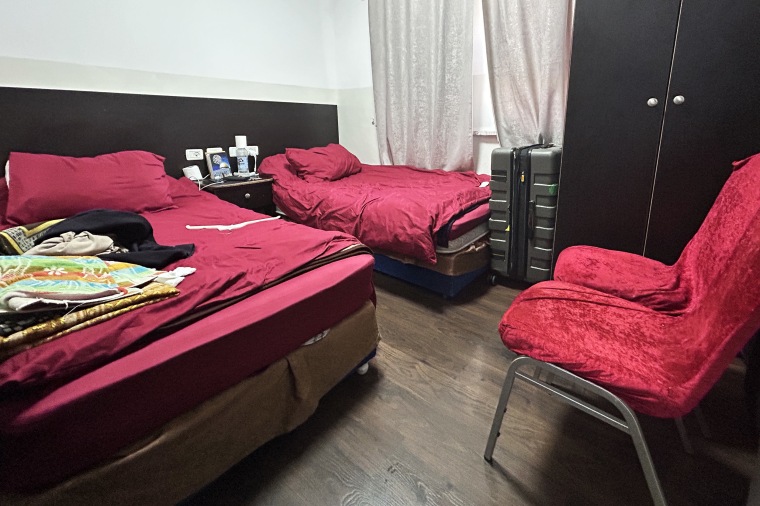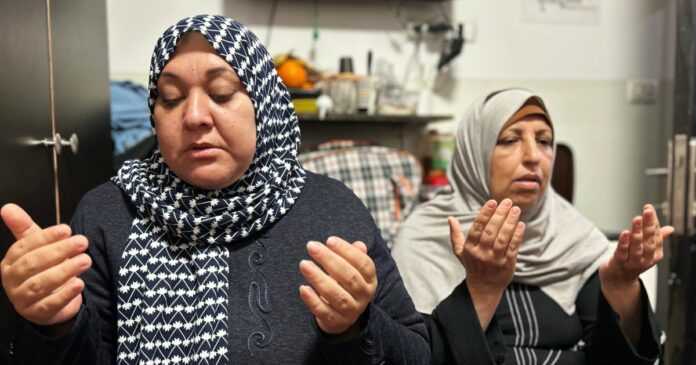JERUSALEM — Reem Abu Obeida and Manal Abu Shaban are both 48-year-old grandmothers from the Gaza Strip, both suffer from breast cancer and both are awaiting an Israeli Supreme Court decision that they say could be a death sentence.
“They would be sending us to the area of hell,” Abu Obeida told NBC News on Thursday. “Our fate will be death.”
The women are among a group of Palestinians from Gaza who have been getting treatment in the cities of Jerusalem and Tel Aviv, but now potentially face deportation back to Gaza, where the health care system has all but collapsed and basic medicines are scarce almost six months after Israel launched its military campaign in the enclave.
Their fate — along with that of the rest of the group of around 20 women and children, patients and their companions — is now in the hands of Israel’s Supreme Court, which issued a temporary injunction Thursday to prevent them being sent back to Gaza. It will make a final decision next month.
Israel’s government, which is arguing that the patients have completed their treatment and have no further need to stay, has asked the court for 30 days to consider its options.
Abu Obeida and Abu Shaban, along with the other patients, say they need ongoing monitoring and follow-up care that is impossible to get in war-torn Gaza.
Among the patients are several children, according to a court filing from Physicians for Human Rights Israel, an Israeli nongovernmental organization, fighting to stop the deportation.
“These are kids and grandparents. Sending them to the inferno, to a place where there is no safety is basically pure evil. Just a heartless action,” said Guy Shalev, the NGO’s executive director.
He said that a 9-year-old girl who was brought out of Gaza to donate bone marrow to her sick brother was facing deportation along with her grandmother. Her brother and their mother had permission to stay because he was still receiving treatment, he added.
The girl’s father was killed in the fighting, meaning she would have to return to Gaza without either parent, Shalev said, adding that the Israeli health care professionals treating her, even those reluctant to speak out against the war, had been “very strict in kind of saying we’re not going to let these people leave the hospital.”
“The taxi was already on the way to pick them up,” he added.
The Coordination of Government Activities in the Territories (COGAT), the Israeli authority involved in the case, did not respond to a request for comment from NBC News.
But in a statement to Israeli media, a COGAT spokesman said: “Gaza residents and their companions who have received medical treatment in Israeli hospitals, and are no longer required to continue medical treatment, are being returned to the Gaza Strip. In cases where further medical treatment is required, COGAT coordinates with the hospitals the continuation of their stay in order to ensure their health.”
They added that the transition of people back to Gaza would be done in coordination with international aid organizations, including the Red Cross, and Israeli military forces on the ground.
In a guest house for outpatients being treated at Augusta Victoria, an imposing hospital on the Mount of Olives in east Jerusalem that primarily provides care for Palestinians from the occupied West Bank, Abu Obeida and Abu Shaban said they left Gaza in September and they had not seen their families since war broke out following the Hamas Oct. 7 attacks on Israel that left over 1,200 dead.

Since then they’ve watched from an agonizing distance as Israel’s military offensive has leveled much of Gaza and killed almost 33,000 people, according to health officials in the enclave. Many more bodies are thought to be under the rubble of destroyed buildings.
“We are living in a tragedy. The body is here, but the soul and the heart is there,” said Abu Obeida, who comes from the city of Khan Younis in southern Gaza. The mom of 11 said her home had been destroyed by an Israeli strike and although her family had survived, three of her daughters had been dug out of the rubble.
Both said they were torn between a desperate desire to reunite with their families and fears for their own health and of burdening their loved ones.
“There is no treatment there at all. Our children live in a tent without food, water or medicine. There are no necessities,” Abu Obeida said, adding that her immune system was still weak after the cancer treatment.
Abu Shaban said she was initially joyful at the thought of being able to return to her home in northern Gaza, where her husband and five children remain. But later she said she learned that Israeli authorities intended to send her to either Khan Younis or Rafah, in southern Gaza, where she has no family.
“I wanted to return to my home and my children,” she said, adding that “tears fell because I was not returning to my home.”
Israel’s government has blocked Palestinians from returning to northern Gaza, where it says the fight against Hamas is ongoing, almost six months into the war.
Most painful, Abu Shaban said, was missing the birth of a new granddaughter named Rahma, which means “mercy” in Arabic. “She is 3 months old, and I haven’t seen her yet. They send me her pictures, but I want to hold her, hug her and see her,” she added.
It was impossible to describe the “feeling of a mother who left her children,” she said.


